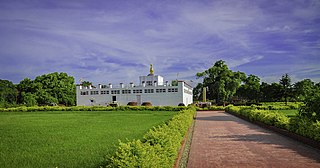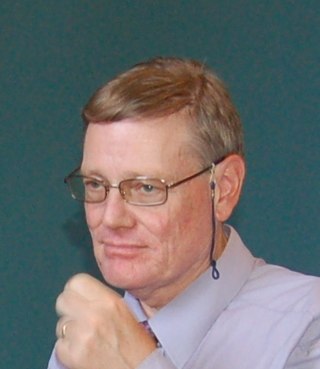Related Research Articles

Lumbinī is a Buddhist pilgrimage site in the Rupandehi District of Lumbini Province in Nepal. It is the place where, according to Buddhist tradition, queen Maya gave birth to Siddhartha Gautama at around 566 BCE. Gautama, who, according to Buddhist tradition, achieved Enlightenment some time around 528 BCE, became Shakyamuni Buddha and founded Buddhism. Lumbini is one of many magnets for pilgrimage that sprang up in places pivotal to the life of the Buddha.

Antiquity is an academic journal dedicated to the subject of archaeology. It publishes six issues a year, covering topics worldwide from all periods. Its current editor is Robert Witcher, Associate Professor of Archaeology at the University of Durham. Since 2015, the journal has been published by Cambridge University Press.
Frank Raymond Allchin, FBA was a British archaeologist and Indologist. He and his wife, Bridget Allchin, formed one of the most influential British partnerships in the post-Independence study of South Asian archaeology. Producing a large body of scholarship ranging from archaeological excavations, ethnoarchaeology as well as epigraphy and linguistics, the Allchins made their work and that of others accessible through a series of sole, joint and edited publications. Seminal works include The Birth of Indian Civilisation (1968), which was later superseded by their books The Rise of Indian Civilisation in India and Pakistan (1982) and The Archaeology of Early Historic South Asia (1995).

Martin John Millett, is a British archaeologist and academic. From 2001 to 2022, he was the Laurence Professor of Classical Archaeology at the University of Cambridge and a professorial fellow of Fitzwilliam College, Cambridge. Since 2021, he has been president of the Society of Antiquaries of London.
Anthony Richard Birley was a British ancient historian, archaeologist and academic. He was the son of Margaret Isabel (Goodlet) and historian and archaeologist Eric Birley.
Christopher John Scarre, FSA is an academic and writer in the fields of archaeology, pre-history and ancient history. He is Professor of Archaeology at the University of Durham and was head of its archaeology department 2010-2013.
Roberta Lynn Gilchrist, FSA, FBA is a Canadian-born archaeologist and academic specialising in the medieval period, whose career has been spent in the United Kingdom. She is Professor of Archaeology and Dean of Research at the University of Reading.
Bridget Allchin was an archaeologist who specialised in South Asian archaeology. She published many works, some co-authored with her husband, Raymond Allchin (1923–2010).
Caroline Vout is a British classicist and art historian. As of 2019 she is a Professor in classics at the University of Cambridge and a fellow of Christ's College. In 2021 she became Director of the Museum of Classical Archaeology, Cambridge.

Maya Devi Temple is an ancient Buddhist temple situated at the UNESCO World Heritage Site of Lumbini, Nepal. It is the main temple at Lumbini, a site traditionally considered the birthplace of Gautama Buddha. The temple stands adjacent to a sacred pool and a sacred garden. The archaeological remains at the site were previously dated to the third-century BCE brick buildings constructed by Ashoka. A sixth-century BCE timber shrine was discovered in 2013.
Cyprian Broodbank, is a British archaeologist and academic. Since October 2014, he has been Disney Professor of Archaeology at the University of Cambridge and director of the McDonald Institute for Archaeological Research. From 2010 to 2014, he was Professor of Mediterranean Archaeology at University College London.
Dame Rosemary Jean Cramp, was a British archaeologist and academic specialising in the Anglo-Saxons. She was the first female professor appointed at Durham University and was Professor of Archaeology from 1971 to 1990. She served as president of the Society of Antiquaries of London from 2001 to 2004.
Christina Riggs is a British-American historian, academic, and former museum curator. She specializes in the history of archaeology, history of photography, and ancient Egyptian art, and her recent work has concentrated on the history, politics, and contemporary legacy of the 1922 discovery of Tutankahmun's tomb. Since 2019, she has been Professor of the History of Visual Culture at Durham University. She is also a former Fellow of All Souls College, Oxford. The author of several academic books, Riggs also writes on ancient Egyptian themes for a wider audience. Her most recent books include Ancient Egyptian Magic: A Hands-On Guide and Treasured: How Tutankhamun Shaped a Century.
Dominic Tweddle,, is an English archaeologist specialising in Anglo-Saxon studies and the director general of the National Museum of the Royal Navy. Previously he spent time as a research assistant at the British Museum and as the assistant director of the York Archaeological Trust, where he helped develop the Jorvik Viking Centre. He is also an honorary professor at the UCL Institute of Archaeology and the University of Portsmouth.

Roger Farrant Bland, is a British curator and numismatist. At the British Museum, he served as Keeper of the Department of Portable Antiquities and Treasure from 2005 to 2013, Keeper of the Department of Prehistory and Europe from 2012 to 2013, and Keeper of the Department of Britain, Europe and Prehistory from 2013 to 2015. Since 2015, he has been a visiting professor at the University of Leicester and a Senior Fellow of the McDonald Institute for Archaeological Research, University of Cambridge.
Lin Foxhall, FSA, MBE, is a Professor of archaeology and ancient Greek History. She has written on women, men, and gender in the classical world. She is an Honorary Professor at the University of Leicester, and in 2017 she was appointed to the Rathbone Chair of Ancient History and Classical Archaeology at the University of Liverpool.
Kristian Kristiansen is a Danish archaeologist known for his contributions to the study of Bronze Age Europe, heritage studies and archaeological theory. He is a professor at the University of Gothenburg.
Marie Louise Stig Sørensen is a Danish archaeologist and academic. She is Professor of European Prehistory and Heritage Studies at the University of Cambridge and Professor of Bronze Age Archaeology at the University of Leiden. Her research focuses on Bronze Age Europe, heritage, and archaeological theory.
Ruth Lorraine Young FHEA is Professor of Archaeology at the University of Leicester.
Anthony Harding is a British archaeologist specialising in European prehistory. He was a professor at Durham University and the University of Exeter and president of the European Association of Archaeologists between 2003 and 2009. Following his doctoral research on Mycenaean Greece, Harding's work has mainly concerned the European Bronze Age, including major studies of prehistoric warfare and the prehistory of salt.
References
- ↑ 'CONINGHAM, Prof. Robin Andrew Evelyn', Who's Who 2017 , A & C Black, an imprint of Bloomsbury Publishing plc, 2017; online edn, Oxford University Press, 2016; online edn, Nov 2016 accessed 12 Oct 2017
- ↑ "UNESCO Professor Robin Coningham, BA, PhD (Cantab.)". Department of Archaeology. Durham University. Retrieved 12 October 2017.
- ↑ "Professor Robin Coningham". United Kingdom National Commission for UNESCO. United Nations Educational, Scientific and Cultural Organization. Retrieved 12 October 2017.
- ↑ Morgan, James (26 November 2013). "'Earliest shrine' uncovered at Buddha's birthplace". BBC News. Retrieved 12 October 2017.
- ↑ "UNESCO Professor RAE Coningham". Department of Archaeology. Durham University. Retrieved 25 March 2019.
- ↑ "Fellows Directory - Coningham". Society of Antiquaries of London. Retrieved 25 March 2019.
- ↑ "Antiquity Trust". Antiquity. Retrieved 2023-08-14.